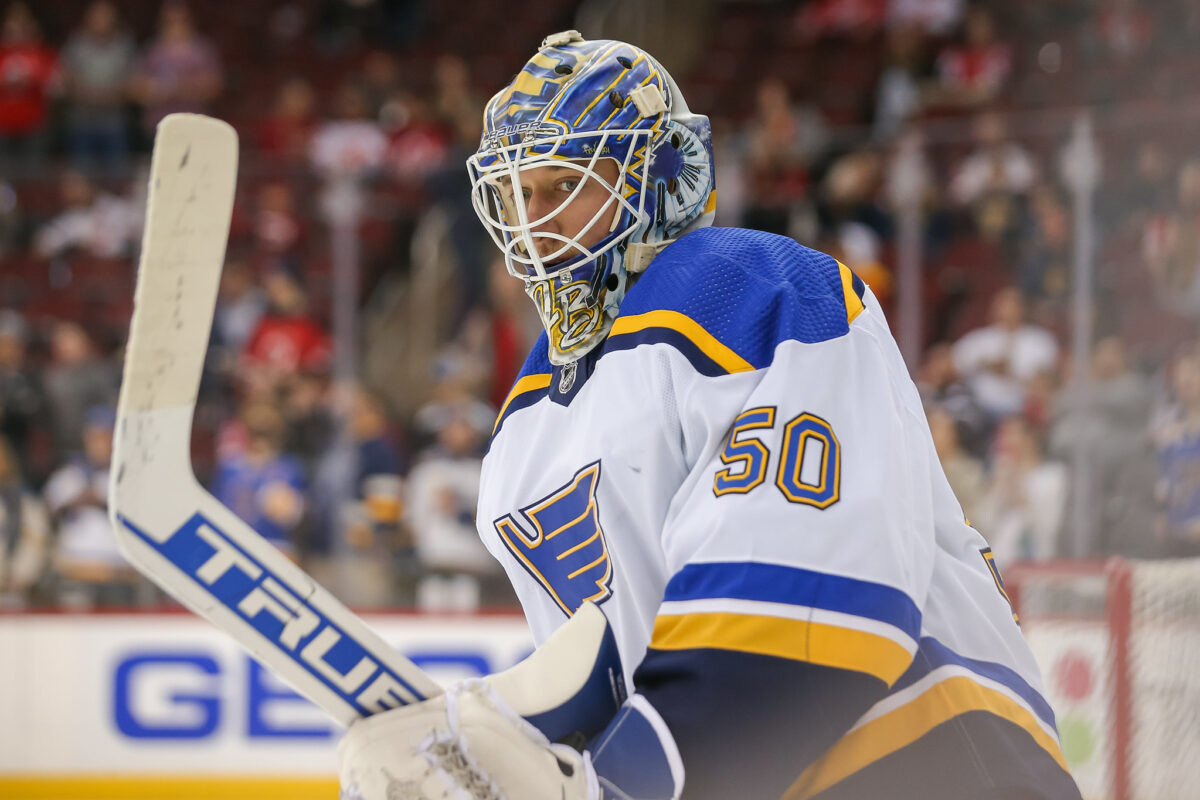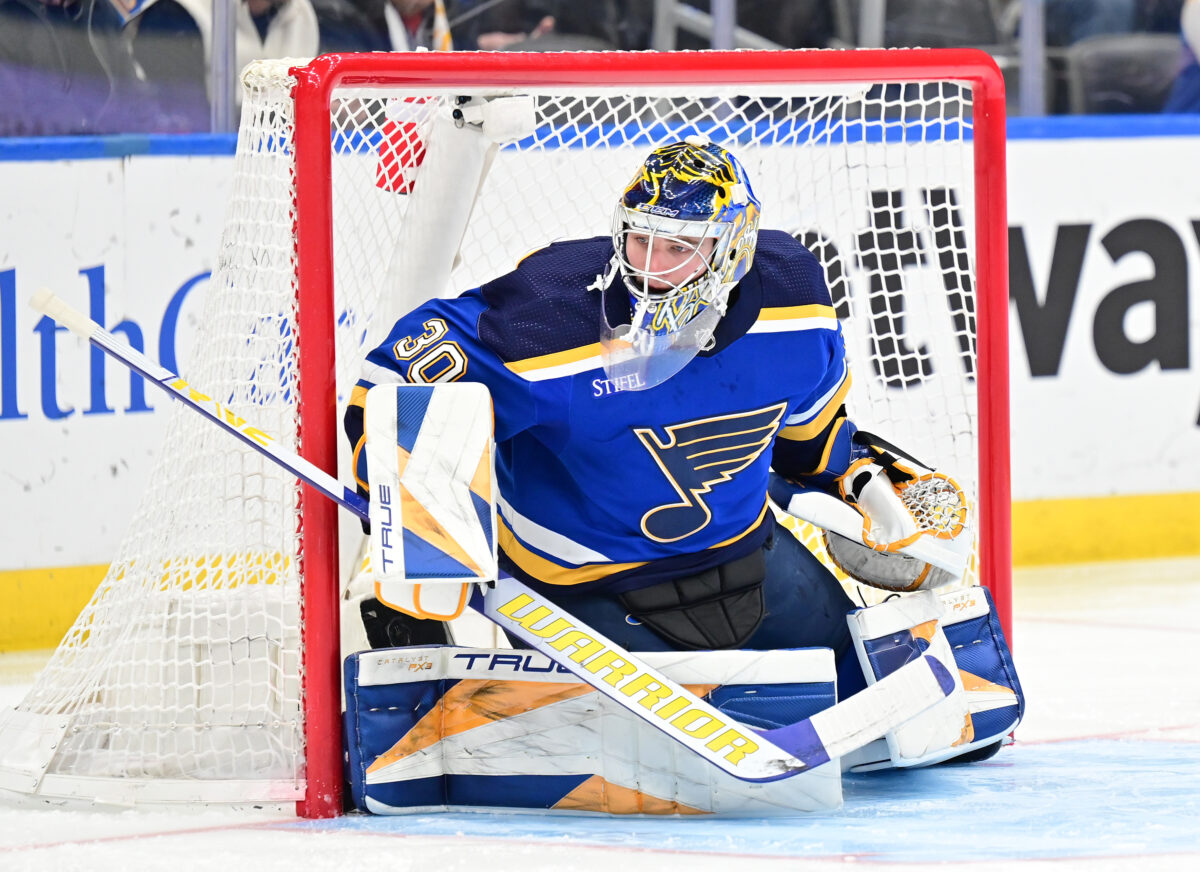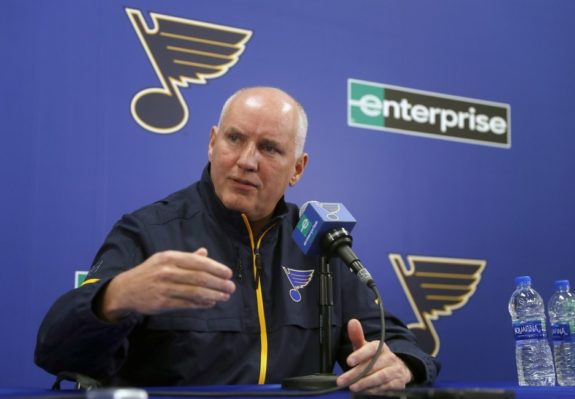Over the offseason, much has been made about the St. Louis Blues’ defense. So far, apart from a few depth re-signings, nothing has been done on that front. But with all the focus pointing toward what general manager Doug Armstrong is doing on the blueline, there has been a relative lack of focus on goaltending.

Over the past two seasons, netminders have made the biggest difference for the team. When Jordan Binnington and, arguably most notably, Ville Husso were at the top of their game, the team thrived. When Binnington or Thomas Greiss struggled, the team sunk. Now, entering a season with Binnington and rookie Joel Hofer as the one-two combo, it’s fair to ask: will the goaltending situation be the Blues’ overlooked Achilles’ heel this season?
Binnington’s Rough Stretch
Binnington did not have a good 2022-23 season, though some defenders would point to the defense as the primary cause. And that’s a fair argument. The Blues’ defense allowed the sixth-most expected goals against (xGA; 278.96) last season and the ninth-most high-danger chances against (HDCA; 1,091). But Binnington was far from blameless. He had the ninth-worst high-danger save percentage (HDSV%) amongst goalies playing 1,000-plus minutes and had the seventh-worst goals saved above average (GSAA) at minus-19.16. While standard stats like save percentage (SV%) and goals-against average (GAA) might not measure a defense’s impact on the goaltender, these advanced stats are specifically designed to do exactly that.
Related: Adjusting How We Evaluate and Analyze Goaltenders
When we look at Binnington over the last two years, the picture does not get much better. Apart from a brief period of exemplary and memorable play during the 2021-22 postseason, his output has been rocky at best. Overall, he’s had a 45-41-10 regular season record, with a .897 SV% and a 3.24 GAA, with minus-26.6 GSAA. It hasn’t been good enough for any starting goalie (which is part of why he lost the job to Husso two seasons ago). It certainly isn’t good enough for a highly-paid goaltender in the third season of a six-year, $36 million contract. Everyone knows what Binnington is capable of. But if he cannot bounce back, the Blues should not expect to be very successful. Especially when his backup is so inexperienced.
Hofer Has a Lot to Prove
Binnington has given way to unproven goaltenders before, as recently as two seasons ago, when Husso clearly took the starting job away from him. But if the starter can’t fulfill his duties this season, the Blues have only a rookie in the truest sense of the word to turn to. Hofer has had a cup of coffee in the NHL each of the last two seasons. He is 4-2-1 with three quality starts and a .900 SV%. But at 22, the Winnipeg native still has a ton to prove.

Hofer was a fourth-round pick in 2018, but he initially rose to prominence in 2020, when he rose from third-string goalie option to carrying Canada to World Junior Championship (WJC) gold with a .946 SV% and a 1.30 GAA in six games. Since then, he’s finished his Western Hockey League (WHL) career and moved to the American Hockey League (AHL) as a pro. Over the last two seasons with the Springfield Thunderbirds, he’s played in 86 regular season games. Last season, he had a 2.50 GAA and a .921 SV%, along with five shutouts, in 47 games. And in the 2021-22 postseason, he played 10 games with a .934 SV%, a 2.56 GAA, and one shutout, helping the Thunderbirds reach the Calder Cup Final.
It seems that Hofer certainly has the “clutch gene,” and he’s had a strong AHL career. It’s a fair time for him to make the jump to the NHL. But it’s too early for him to shoulder a heavy workload. So Binnington will have to carry the lion’s share of the starts. That’s fine if he looks like the goaltender he was early in his career. But if he continues the trend of the last two seasons, the team might be in trouble.
Dubious By Design?
Of course, there is an argument to be made that Armstrong is well aware of his team’s goaltending shortcomings and either doesn’t want to or cannot address them in the short term. The Blues are not currently built to compete next season. With some hot goaltending and better-than-expected defense, they could squeak into the playoffs. But they are still clearly in the middle of a rebuild that Armstrong first started talking about last season.

It’s not fair to say that they are truly tanking, but Armstrong may be willing to take his lumps for a season or two as he waits for his prospects to mature and for the salary cap to increase so he can hopefully start to unburden himself from troublesome contracts. In the meantime, he likely wants to nurture Hofer into the goaltender of the future. If that’s his goal, it’s important not to overexpose him in his first season. Bennington doesn’t have to be the best goalie, but he has to be good enough to carry the workload for a full season. If he can do that, then no one can reasonably complain about the netminding this season. Higher expectations than that are unrealistic.